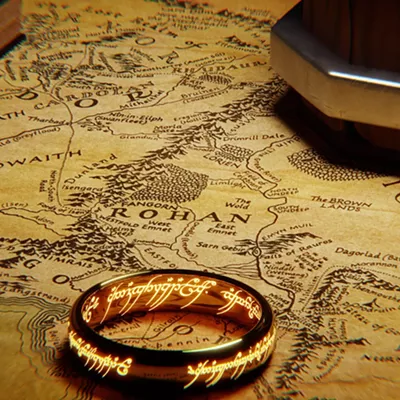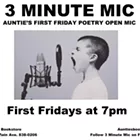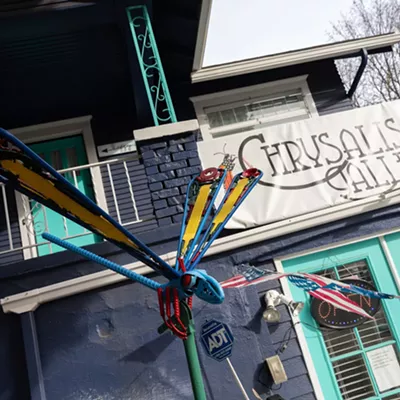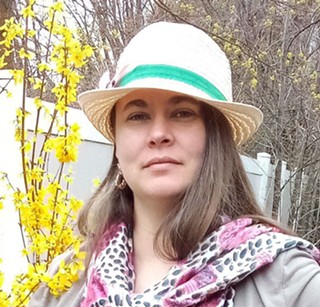Spring buds burst forth on the trees. Unfurling into leaves, their lush greenery provides shade and solace on summer's hottest days. During fall's final gasp, the canopy is awash with brilliant colors until the chill withers the foliage that then falls, brown and dead, onto the frozen winter ground.
Caught in nature's cycle of birth, growth, death and renewal, all of us eventually reach our final season. But who's to say we'll actually be ready to die?
Death, says Samantha Potter, "is such a taboo topic because it's the one thing none of us can avoid."
The local estate planning paralegal and end-of-life expert recently began hosting monthly public "Death Cafes" at local libraries in Spokane in order to create a welcoming and open space for conversations about dying, including our fear of it. Death Cafes aim to normalize the unavoidable reality and to discuss how to make life count.
The concept originated from Bernard Crettaz, a Swiss sociologist and anthropologist. The death of Crettaz's wife led him to create, in 2004, what he called the "Cafe Mortel." He later wrote a book on the subject, Death Cafes: Bringing Death Out of Silence.
Since their inception, Death Cafes have spread worldwide as interest has increased. Strangers, friends and families have gathered at more than 17,000 such events, which are tracked on a central website for the movement (deathcafe.com) to share cake, donuts, tea and coffee while talking about life's end.
In Spokane, Potter facilitates Death Cafes every second Sunday at Spokane Public Library branches and has held eight such events since July 2023. Whether the cafe is held online, in a room with people gathered around a central table, or in a more casual setting with couches and chairs, it's a confidential, no-pressure gathering.
One couple recently attended one of Potter's Death Cafes because the wife has lung cancer.
"Although her health was good, [she] felt very close to death," Potter says.
While Potter says a Death Cafe is not a grief support group, attendees can still express their emotions, whether it's anticipatory grief for their own or a loved one's demise, or in response to losing someone close. For participants searching for more answers or support, Potter can provide a list of resources.
"I've been talking to people about death and dying for over a quarter of a century," Potter says.
While she's not ready to fully retire just yet after working nearly 28 years as a paralegal, she works part time as an end-of-life doula (also called a death doula) and a life coach — focusing on major life transitions and bereavement — through her consulting business, Rubicon's Edge.
End-of-life doulas work with people nearing death alongside their caregivers and family, offering services such as companionship as well as emotional, spiritual and practical support, including helping around the house. Death doulas were very rare until the COVID pandemic. The National End-of-Life Doula Alliance (formed in 2015) had 260 U.S. members in 2019. As of January 2024, there were 1,545.
Training for doulas can differ between certification organizations. Potter trained in 2022 through three different organizations to gain a wide range of experience, and has two certifications.
Hosting Death Cafes for the Spokane community was a natural step.
"Offering the Death Cafe is a way to help the community get to a more holistic approach to death," says Potter, who has previously battled cancer. "I'm not trying to get people to rush toward death, but at least be able to consider it as a normal part of life. Since the early 20th century, [death] has become more institutionalized. Used to be that you died at home, surrounded by your family. In earlier times, you were so close to it — you might not want to die, but you couldn't avoid the experience of death."
Potter's own first exposure to death came when she was about 4 years old. Her Aunt Sylvia had cancer and chose to forgo treatment and hospitalization because of her religious beliefs. Potter and her mother cared for her.
"My Aunt Sylvia was my favorite person in the whole world," Potter says. "She's the only adult that really had time for me until she got so sick."
Sylvia spent her last few months in pain. When Potter saw her aunt's body at the funeral, she remembers saying to her mother, "She doesn't hurt anymore."
"Maybe that was my calling to do death work," Potter says with a smile. ♦
Death Cafe with Samantha Potter • Sun, April 14 from 1:30-3:30 pm • Free • Hillyard Library • 4110 N. Cook St. • deathcafe.com




















